Money Before Matrimony

Saying “I do” later in life may come with extra financial considerations when you have a pension, RRSPs, a house or other assets to protect. It can be wise to get frank about your finances before you exchange rings. Here are some things to discuss.
November 4th, 2022
When Nicole Ewing joined an online dating site ten years ago, she purposely uploaded an honest photo and profile of her true self.
Three years later, Ewing was just as forthcoming when she and her then-fiancé (now husband), Joe, sat down and had a discussion about what they owed and owned, their money obligations, retirement plans and ideas for a pre-nuptial agreement (prenup).
Having the “money talk” before you get married may be even more important for established people who have accumulated decades’ worth of assets, such as a home, a pension, RRSPs, and perhaps a business. If you have a successful career, you have more to protect than if you are just starting out. That’s because marriage can bind two people’s finances together. Family law generally dictates that, “what’s yours is mine and what’s mine is yours.” Knowing that, and given the prevalence of divorce and separation among Canadians, everyone should consider getting a prenup before their wedding day. 1
Sitting down, taking your partner’s hand and saying, “Honey, we need to talk cash flow,” may not be the most romantic wedding gesture, but it might be the most useful. As anyone who has dated online knows, what you see is not always what you get. Finding out your beloved is in debt, has previous financial responsibilities or simply has different spending habits could prevent post-honeymoon surprises.
It may even save a future marriage from coming apart if it gets the couple earnestly talking and working on money problems before those issues get out of control.
It’s important to be honest about money
Nicole Ewing walks the talk. As Director of Tax and Estate Planning with TD Wealth, she’s often used her own story to advise people in similar situations.
“I’ve seen marriages break up because people misrepresented their circumstances and ignored the role of finances in their marriage until it was too late,” she says.
Ewing says that just as couples must promise to love, honour and cherish each other, they must be open and honest with their partner in regard to their finances. That means having a discussion— often a hard one — and revealing the true nature of their financial situations, complete with statements and other paperwork.
“If somebody is not sharing the bad news about their finances, then they may not be sharing the bad news about a lot of other things as well. It’s more of a symptom than an isolated issue,” Ewing points out.
Furthermore, Ewing says it may be too late to have the money talk after the honeymoon is booked, the reception is paid for or after you have bought a house together. It has to happen right at the beginning in order to smooth out all the plans and purchases that go with marriage.
Ewing says her own money talk with her husband prior to walking down the aisle. It sorted out misconceptions he had about what would happen to their respective property after they got married. The couple worked with their lawyers and signed a pre-nuptial agreement, and the act actually helped Joe feel more confident about the marriage. But Ewing insisted on it as well.
“In my previous marriage finances became a real issue. I need the security of having my own money and being able to provide for myself in the future,” she says.
She says the conversation she had with her husband got down to the nitty-gritty of what couples owe each other financially. Joe had heard horror stories of people being left impoverished when their marriage broke down, and he mistakenly thought that if he got married, his whole government pension could be at stake.
“It’s funny because I’m in the personal finance industry and my husband is not, and when we started, it was an education for him. It was a matter of letting him know what the general default rules over property in a marriage were [if no prenup exists] and what would happen if we did nothing,” she says.
A prenuptial agreement can head off problems
A prenup does not guarantee a problem-free division of assets if the marriage fails, but a valid agreement can go a long way toward settling financial issues. When a couple divorces, the Family Law Act — each province’s legislation is different — may have a powerful influence over how the money and property of both partners during the marriage is valued and shared.
Similarly, if a spouse dies and the other spouse doesn’t feel they’ve been treated fairly in a Will, they may be able to challenge the Will and get ownership of the deceased spouse’s assets if no prenup has been drawn up.
Ewing even suggests that couples who got married without a prenup write a “post-nuptial” agreement if they feel the need to be clear about their financial state and their intentions.
She emphasized that the key is honesty. Couples must be totally honest and open when they draw up these contracts. Being anything but completely open about your situation could invalidate the contract and, if the marriage breaks down, everything you own may be up for grabs.
As for Ewing’s prenup, she said they had to work out what their plans and obligations were to each other; they both had pensions and had purchased a house together on the Rideau River, but Joe also kept his previous home.
“Because of everyone’s diverse backgrounds and situations, it’s common for couples to come together with highly different, and even unequal, financial circumstances. For instance, if one spouse has one child and the other spouse has three children, the obligations are going to be different. But I think if people communicate about these responsibilities and involve their advisors in the conversation as well, there’s usually a solution to the problem,” Ewing said.
Different money styles can co-exist
They say that opposites attract. But when each partner comes to the altar with widely different behaviours around money, the differences may be problematic. Someone who is used to saving and accounting for every penny, for example, may find it difficult to marry someone who believes in an ‘easy come, easy go’ attitude. If one partner is spending their new partner’s money out of all frivolously, the couple should have a talk about what the rules and plans are around their money.
“Something as basic as building a budget is important,” Ewing says. “Discussing lifestyles, costs and obligations can bring out revealing information…you can start to see where there may be some discrepancies.”
Compatibility problems can also crop up if there’s a big gap between the couple’s respective net worths prior to marriage. Couples may also have different risk tolerances when it comes to investing.
These may not be easy discussions. It can be difficult to discuss obligations concerning a previous marriage, poor investments or net worth differences, but having to dredge up memories of a poor credit rating or bankruptcy to someone you want to impress can be considerably harder. That’s why your approach is so important.
How to start an honest conversation about money
To begin, it can help to express that you want the relationship to be the best it can be as well as the fact that money is a leading cause of marital breakdowns, so you’d like to address the financial aspect of your relationship before you begin to encounter problems.
Make the discussion about you opening up about your finances, rather than demanding your spouse reveal their information. “I think you should know about my finances,” is often a good opening line. Above all, be patient. When you first open the conversation, your partner may be reluctant to talk about it. Give them time to think about it.
If couples have questions or concerns about how to protect their assets before they exchange rings, they should speak with an advisor and lawyer. Having different ideas around money need not doom a marriage — clear understanding and mutually agreed upon rules and boundaries simply have to be worked out.
“When a couple is coming together in marriage and they really want the best for each other, they tend to give a true description of their finances. After all, when couples work together as a team, they are far more likely to achieve their goals,” Ewing said.
DON SUTTON
MONEYTALK LIFE
ILLUSTRATION
DANESH MOHIUDDIN
- A fifty-year look at divorces in Canada, 1970 to 2020, Statistics Canada, Mar. 9, 2022, accessed Oct. 28, 2022, www150.statcan.gc.ca/n1/daily-quotidien/220309/dq220309a-eng.htm ↩
















